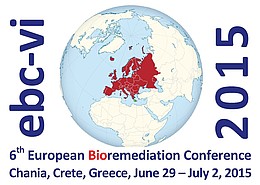Topics
SPECIAL SESSIONS
Special session on Environmental Biotechnology as Honorary Farewell to Prof. Spiros Agathos (Tuesday, June 30, 2015)
Final Conference FP7 project BIOCLEAN (Monday, June 29, 2015)
Special Sessions within the Conference
SS-1. (Bio)-Technologies to combat marine oil spills / Monitoring systems / Biosensors / Early Warning Systems
SS-2. Litter prevention, plastics biodegradation and bioplastics
SS-3. Biomineralization and biomining of inorganics - unifying remediation with resource recovery
SS-4. Microbial fixation of CO2 (and other climate change inducing gases) in soils with indigenous microbial community management and via other biotechnological processes
SS-5. Exploitation of microbes from non-conventional and/or contaminated habitats
SS-6. Multidisciplinary approaches for bioremediation of polluted sites and bioconversion of biowaste (e.g., through nanobiotechnology) - Interface between environmental biotechnology and white biotechnology.
Special EFB/Environmental Biotechnology Section organized workshops
W-1. Reinforcing bio-economy in Mediterranean countries.
W-3. Future Research Needs in Environmental Biotechnology / Research funding opportunities (all invited speakers)
REGULAR CONFERENCE TOPICS
The objective of the conference is to bring together scientists, engineers and other environmental professionals to present their findings and discuss future trends, directions and new challenges for the restoration of contaminated sites and marine environments as well as on resource preservation through recycling and bio-based reclamation.
The presentations are expected to focus on the technological advances of bioremediation treatment processes (including phytoremediation) for all types of media (air, soil, sediment, surface water, groundwater and industrial wastewater) contaminated with petroleum hydrocarbons, chlorinated and other recalcitrant compounds, as well as on techniques for the microbiological, genetic and ecotoxicological monitoring of such processes. Innovative and low cost solutions through an integrated technological approach are also invited. Finally, contributions are invited on resource preservation through recycling and bio-based reclaimation of wasted resources.
Topics
1. In-situ bioremediation of contaminated soil and groundwater
2. Ex-situ bioremediation of contaminated soils, sludges and industrial wastewaters
3. Bioremediation of sites contaminated with crude oil, petrochemicals and PAHs
4. Bioremediation of sites contaminated with chlorinated and other recalcitrant compounds
5. Phytoremediation technologies for decontamination of organic pollutants - Constructed Wetlands for emerging compounds, pharmaceuticals & priority pollutants
6. Phytoremediation and bioremediation technologies for removal of heavy metals
7. Biomonitoring and bioremediation of contaminated sendiments
8. Biostimulation and/or bioaugmentation for polluted marine environments / Technologies to combat marine oil spills / Monitoring and Early Warning Systems
9. Bioreactor technologies for ex-situ treatment
10. Innovative approaches and tools for monitoring and bioremediation of emerging pollutants in soils, sediments and groundwater
11. Bioremediation and integrated (bio)chemical valorization (via biomolecules, fine-chemicals, biomaterials and bioenergy production) of agro-industrial byproducts, effluents, wastes and surplus (organic waste multipurpose biorefineries)
12. Mathematical modelling of bioremediation processes and performance evaluation
13. Blue growth opportunities in the context of environmental protection & restoration
14. Wastewater valorization, bioremediation, purification and reuse

